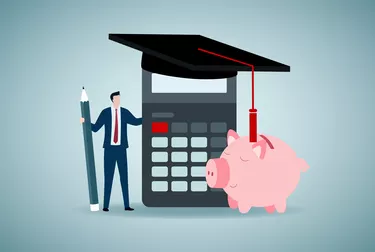
When the White House announced its historic student loan forgiveness plan, you might have felt a welcome relief but also wondered if it would affect the taxes owed when you file your 2022 tax return in 2023. Since you could end up with $10,000 to $20,000 of your loans forgiven, having to pay both federal and state taxes could heavily strain your finances. The good news is that you shouldn't end up with a higher federal tax bill, though you might get charged at the state or local level.
Considering the Federal Tax Implications
Video of the Day
Before the American Rescue Plan of 2021, the IRS often considered student loan forgiveness to be part of your gross income subject to federal income taxes. Some exceptions to this included becoming permanently disabled, passing away or getting relief under the Public Service Loan Forgiveness program.
Video of the Day
The good news is that you shouldn't end up with a higher federal tax bill, though you might get charged at the state or local level.
So, if you had $20,000 forgiven and were in the 22 percent tax bracket, you might have written an extra $4,400 check to the IRS. Your taxable forgiven debt would have been reported on a tax form called 1099-G if it was for $600 or more. The amount would have gone on your Form 1040 as "other income."
However, the IRS reports a pause in including forgiven student loan debt as income for the 2021 to 2025 tax years. It has also instructed lenders not to complete or send out Form 1099-C. Therefore, the forgiveness you receive from President Joe Biden's program shouldn't make you liable for extra federal taxes or require reporting on your tax return in 2023. The same applies to other eligible student loans you might have canceled before 2026.
Paying State and Local Taxes
According to CNBC, most states either follow the federal guidelines or have their own provisions not to charge taxes on your forgiven student loan debt. However, you could be on the hook for taxes if you're in one of the seven states that charge taxes on such forgiven debt by default or haven't yet decided on an exemption. These include California, Indiana, Arkansas, Minnesota, North Carolina, Mississippi and Wisconsin.
For example, the North Carolina Department of Revenue lists a flat 4.99 percent income tax rate for 2022 income. This could mean paying $499 in state taxes with $10,000 in student loan forgiveness or $998 with $20,000 forgiven. As another example, the Indiana Department of Revenue has a 2022 state income tax rate of 3.23 percent. That could mean either a $323 or $646 tax liability depending on your forgiven amount.
Along with any state taxes due, local taxes could apply too. Therefore, you'll want to research your locale's tax laws if you're in one of these seven states. Plus, keep an eye on any updates from the state department of revenue.
Preparing for Loan Forgiveness Taxation
You should plan ahead if you expect to owe state or local taxes on your student loan forgiveness amount. Consider estimating your potential taxes due so that you can make estimated state income tax payments if needed. Otherwise, you could face an underpayment penalty when tax time arrives in 2023.
While you likely won't report the forgiven amount on your federal return, you may need to do so on your state return. Therefore, you'll want to have documentation on hand showing the forgiven amount. If you plan to do your own tax return, your state may have a special schedule to add back income such as forgiven debts. For example, the Indiana DOR offers Schedule 1 for this purpose.
If you expect to have student loans forgiven in 2026 and beyond, you could face both federal and state income taxes at that time. However, it will ultimately depend on the loan forgiveness program and any laws in place then. In any case, it can offer peace of mind to start putting extra money aside in case you end up with a tax burden. If you end up owing nothing, you'll still have cash set aside for some other purpose.
- Indiana Department of Revenue: Tax Rates Fees & Penalties
- Indiana Department of Revenue: Indiana Full-Year Residents
- IRS: Topic No. 431 Canceled Debt – Is It Taxable or Not?
- CNBC: Here’s How To Calculate Your Bill for Student Loan Forgiveness, if You Live In One of the 7 States That May Tax It
- IRS: Notice 2022-1 - Instructions for Lenders and Loan Servicers Regarding Certain Discharged Student Loans
- The White House: Fact Sheet: President Biden Announces Student Loan Relief for Borrowers Who Need It Most
- North Carolina Department of Revenue: Tax Rate Schedules